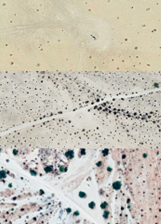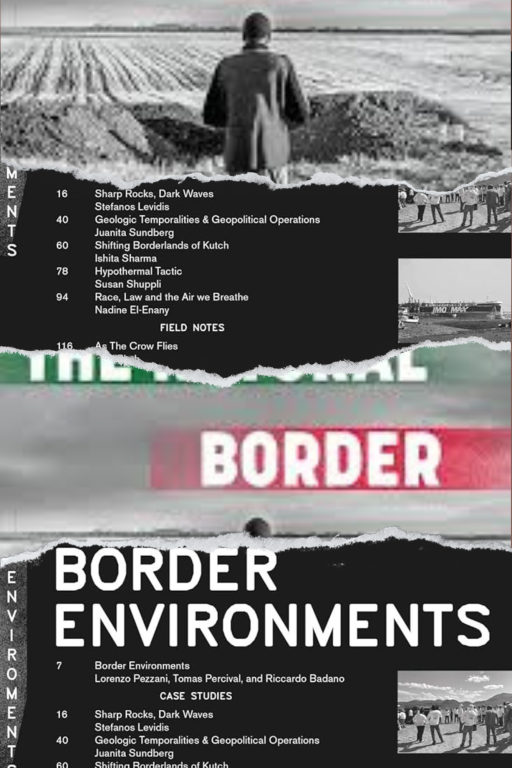The Natural Border/Border Environments
@ Biblioteca Amilcar CabralVia S. Mamolo 24

presentazione dei libri / Joint book presentation
Presentazione dei libri The Natural Border di Timothy Raeymaekers, Cornell University Press, 2024 e Border Environments di Riccardo Badano, Tomas Percival and Susan Schuppli (eds) Leipzig Spector Books, 2023.
L’incontro fa parte parte di una serie di eventi organizzati dal gruppo di ricerca LIMINAL e parte del progetto HEMIG project - Hostile Environments: the Political Ecology of Migration and Border Violence che si propone di riformulare la nozione di “ambiente ostile” come lente concettuale e analitica per ripensare la relazione tra ambiente e migrazione.
Dopo le presentazioni dei rispettivi volumi da parte di Timothy Raeymaekers e poi di Riccardo Badano, Tomas Percival e Susan Schuppli, Pelin Tan e Patricia Daley condurranno la discussione, mettendo in dialogo tra loro i due libri e aprendo il dibattito su questi temi urgenti.
Incontro aperto a tutt* in lingua inglese.
Joint book presentation: The Natural Border by Timothy Raeymaekers, Cornell University Press, 2024 and Border Environments by Riccardo Badano, Tomas Percival and Susan Schuppli (eds) Leipzig Spector Books, 2023.
The presentation is part of a series of events organised by LIMINAL a part of the HEMIG project - Hostile Environments: the Political Ecology of Migration and Border Violence which aims to reframe the notion of ‘hostile environment’ as a conceptual and analytical lens to rethink the relationship between environment and migration.
After the presentation of their respective volumes first by Timothy Raeymaekers and then by Riccardo Badano, Tomas Percival and Susan Schuppli, Pelin Tan and Patricia Daley will lead the discussion, creating a dialogue between the two books and opening the debate on these pressing subjects.
Meeting in English open to everyone.
Timothy Raeymaekers’s scholarship focuses on commodity frontiers, in particular with regards to mineral and agricultural markets in Central Africa and the Mediterranean. In his research he seeks to raise questions about the power relations that underpin contemporary supply chain capitalism, with particular attention to the work of territorial boundaries and the politics of differentiating value in goods and labour. Recent publications include a collective volume on the Black Mediterranean (with PalgraveMacMillan), an edited collection on Italian agri-food work (with SEB27), and a monograph on migrant farmwork in agriculture (The Natural Border: Bounding Migrant Farmwork in the Black Mediterranean: Cornell University Press).
Riccardo Badano is an architect, researcher, and editor working at the intersection of migration circulations and critical ecologies. He is currently a Tutor on the MA City Design programme at the Royal College of Art. Badano completed his MA at the Centre for Research Architecture, where he is currently undertaking his PhD.
Tomas Percival is an artist, researcher, and writer. His work critically investigates the intersections of space and security, with a particular interest in structures of assessment, risk governance, carceral geographies, data infrastructures, and border administration. He was previously a Lecturer at the Centre for Research Architecture, where he is completing his PhD. He is currently a fellow at Humboldt-Universität zu Berlin.
Susan Schuppli is an artist-researcher whose work examines material evidence from war and conflict to environmental disasters and climate change. Her current work is focused on Learning from Ice and is the subject of numerous documentary films. Schuppli is the author of Material Witness (2020) and is the Director and Professor at the Centre for Research Architecture, as well as the Board Chair of Forensic Architecture.
Pelin Tan is a sociologist and art historian; Prof.at the Faculty of Fine Arts, Head of the Film Dept.,Batman University, Türkiye. She is Senior Research Fellow of the Center for Arts, Design and Social Research, Boston. Hans-Robert Roemer Fellow, Orient Institute Beirut, 2024. Editor of i press architecture publication, Cambridge. She is a member of spatial research collective Arazi Assembly, Mardin. She has curated: Gardentopia of Matera, ECC, 2018 -2020; Retrospective of Didier F. Faustino (MAAT, Lisbon, 2023- 2024). She is co-curator of Urgent Pedagogies, IASPIS. Forthcoming book: Forms of Non-Belongings, E-Flux Books, 2024.
Patricia Daley is Professor of the Human Geography of Africa. She is also the Helen Morag Fellow in Geography at Jesus College, Oxford, where she served as Vice-Principal from 2018 to 2021. She was the University Assessor (2015-2016) and co-founder of the Oxford University Black and Minority Ethnic staff network. Her principal research interests can be grouped under four themes: (1).The political economy of population migration and settlement (forced migration, identity politics and citizenship); (2) The intersection of space, gender, militarism, sexual violence and peace (feminist geo-politics); (3) Racial hierarchies and violence (geographies of racialization and coloniality using Critical Race Theory and decolonizing methodologies); (4) The relationship between conservation, resource extraction, and rural livelihoods (political ecology). The geographical loci of research are East and Central Africa, and the UK.
Pic by Tara Plath Border environments




